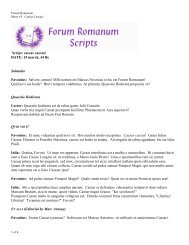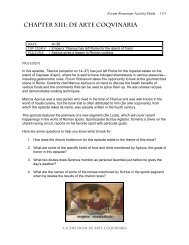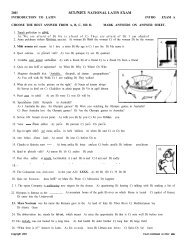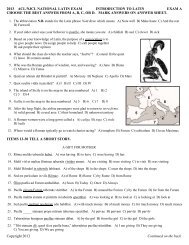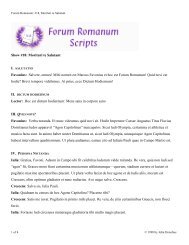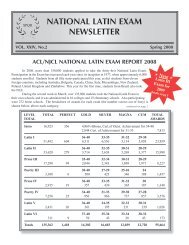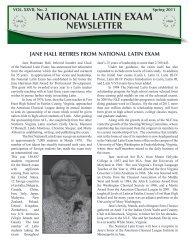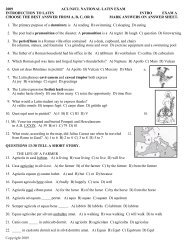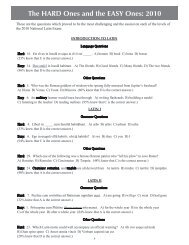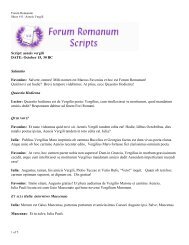2011 Intro Latin Exam - The National Latin Exam
2011 Intro Latin Exam - The National Latin Exam
2011 Intro Latin Exam - The National Latin Exam
You also want an ePaper? Increase the reach of your titles
YUMPU automatically turns print PDFs into web optimized ePapers that Google loves.
<strong>2011</strong> NATIONAL LATIN EXAM<br />
TRANSLATION KEY<br />
<strong>Intro</strong>duction to <strong>Latin</strong>: “MISSED MEALS”<br />
“Rufus is waiting for food at the door,” the cook replies.<br />
“Call Rufus!” the master shouts. “We have already given food to the slaves!”<br />
While the master is eating dinner, the cook calls Rufus. <strong>The</strong> master has much food but Rufus has no food.<br />
<strong>The</strong> master shouts, “Why are you not taking care of my eight horses in the fields? Why are you waiting for food? We have already given food to the slaves.”<br />
Rufus replies, “Because I was taking care of a pregnant horse yesterday, I did not have dinner. Today I was taking care of the weak horses, and again I did not eat.”<br />
“But who is taking care of my eight horses now?” the master asks.<br />
“Today there are ten horses, master.” Rufus replies. “Yesterday the horse gave birth to twins. <strong>The</strong> twins are weak, and I was taking care of them. Today you have ten<br />
beautiful horses!”<br />
“You are a good slave!” the master exclaims. “You have increased the number of my horses. I happily give food to you because you work well.”<br />
<strong>Latin</strong> I: “SLOWPOKE’S ESCAPE”<br />
A turtle, named Tardus, always used to live on land. But once upon a time bad men captured him. <strong>The</strong>y carried Tardus to the city and placed him before the king, who said,<br />
“How, Tardus, shall we cook you?”<br />
Tardus immediately responded, “It is necessary first both to kill me and pull me out of my shell.”<br />
<strong>The</strong>n the king replied to Tardus, “We will destroy your shell and you with many swords.”<br />
“Swords, O king and men, will not kill me. If you throw me into water, water will kill me.”<br />
“Yes indeed,” the men shouted, “water will be your end!” <strong>The</strong>y threw Tardus into the water of a lake. <strong>The</strong>n the men were happy because they believed that Tardus was<br />
dead.<br />
However Tardus’ head rises from the water and Tardus laughs, “You put me into water but not into a cooking pot, foolish men! I am free! Now I will live in water. <strong>The</strong>re<br />
men are not able to capture me.” Now and always turtles live in water, because Tardus the turtle was slow on foot, (but) swift in mind.<br />
<strong>Latin</strong> II: “MARCUS CURTIUS, A VERY BRAVE CITIZEN”<br />
<strong>The</strong> ancient Romans not only loved their country strongly but also were accustomed to seek death willingly for their country.<br />
Once upon a time a great crack had appeared on account of an unknown reason in the middle of the forum. <strong>The</strong> Roman citizens were very greatly frightened. <strong>The</strong>y prepared a supply<br />
of earth and rocks and threw it into the crack. But they worked in vain because the crack was able to be filled with neither rocks nor earth.<br />
Finally help was sought from the gods. <strong>The</strong>n an oracle of the gods responded thus, “<strong>The</strong> greatest of your possessions ought to be thrown into that crack. <strong>The</strong>n the crack will be filled.<br />
Among the Romans there was at that time a very brave citizen, by the name Marcus Curtius. He said, “I know that the greatest of our possessions is not gold nor gems. <strong>The</strong> brave and<br />
faithful spirit of a Roman citizen is the greatest of our possessions.”<br />
<strong>The</strong>n he climbed onto his horse and rode into the wide crack. As soon as the horse and man withdrew from the sight of the Romans, the crack was filled.<br />
Later the place in the Forum, where Marcus Curtius gave his life for his country, was called Lacus Curtius by the Romans.<br />
<strong>Latin</strong> III: “HANNIBAL CROSSES THE ALPS”<br />
Hannibal, the famous Carthaginian commander, is said to have led 80,000 foot soldiers, 20,000 cavalry, and 37 elephants into Italy across the Alps. <strong>The</strong> elephants were driven through<br />
steep ways with great delay, but on the ninth day they arrived at a ridge of the Alps where rest was given to the soldiers tired from work and fighting. A snowfall, however, brought terror.<br />
At dawn, the marching column began to proceed through the snow. <strong>The</strong> rest of the route was much more difficult than the ascent. Finally, the soldiers arrived at an obstructing boulder, and<br />
it was necessary to shatter the boulder in order to open the way. <strong>The</strong>refore, they made a heap of wood. When the force of the wind was suitable for making fire, they lit the heap. <strong>The</strong>n they<br />
made the heated boulder to crumble with vinegar poured on. Thus they broke the boulder with fire so that not only the soldiers but also the elephants were able to be led down. In three days<br />
they descended to the plain and came into Italy.<br />
<strong>Latin</strong> III-IV Prose: “THE PLIGHT OF CICERO”<br />
I write letters to you less often than I am able, because when I either write to you or read your (letters), I am overwhelmed by tears to such a degree that I cannot bear (it). If I had been<br />
less desirous of life, certainly I would have seen nothing or not much of evil in life. But I desire, my life, to see you as soon as possible, and to die in your embrace. Neither the gods, whom<br />
you most chastely have worshipped, nor men, whom I have always served, have shown gratitude to us. For thirteen days I have been in Brundisium at the home of M. Laenius Flaccus, an<br />
excellent man, who has neglected the danger of his fortunes and of his own head on account of my welfare. I am intending to set out from Brundisium on April 29, heading for Cyzicus<br />
through Macedonia. Should I ask you to come? Should I not ask? <strong>The</strong>refore am I to be without you? Know this: if you come to me, I shall not seem to myself to have entirely perished. I am<br />
not able to write more now; grief impedes (me).<br />
<strong>Latin</strong> III-IV Poetry: “A BAD HAIR DAY”<br />
I kept saying, “Cease to treat your hair.” Now for you there is no hair which you are able to dye. Neither, however, was it black nor, however, was it golden, but although neither, (it<br />
was) each color mixed. Why do you complain that your badly treated hair has been lost? Why do you put aside the mirror, foolish girl, with a sad hand? Now Germany will send you captive<br />
hair (i.e., a wig); you will be safe because of the gift of a conquered nation. She holds and looks at her hair on her lap. Woe is me, (those are) gifts not worthy of that place! Compose your<br />
mind (along) with your expression! <strong>The</strong> loss is reparable. Shortly, you will be seen with your own hair.<br />
<strong>Latin</strong> V-VI Poetry: “PENELOPE WRITES A LETTER TO ULYSSES”<br />
Ulysses, your Penelope sends these (words) to you, tardy one; it helps not at all that you write back: come yourself! Certainly Troy, hated by Greek girls, lies (defeated); hardly was<br />
Priam -- and Troy entire -- of such great worth. O, would that the adulterer had been overwhelmed by raging waters at the time when he was heading for Sparta with his fleet!... When have I<br />
not feared dangers more serious than real ones? Love is a thing full of anxious fear. I used to imagine furious Trojans about to go against you; I was always pale at the name of Hector... As<br />
victor, you are (still) not here; nor is it permitted for me to know what (is) the cause of your delaying, iron-hearted one, or in what (part of the) world you lie hidden... Surely I, who had been<br />
a girl as you were leaving, will seem to have become an old woman, as soon as you come (back).<br />
<strong>Latin</strong> V-VI Prose: “A LETTER TO CORNELIUS PRISCUS”<br />
I hear that Valerius Martial has died and I am taking it badly. He was a man talented, intelligent, sharp, and (one) who had very much both of wit and of bitterness in his writing and<br />
not less of candor. I had seen him off departing with money for his journey; I had given this for friendship, I had also given this for his little verses which he composed about me. It was of<br />
ancient custom to recognize either with honors or with money those who had written praises either of individuals or of cities; but in our times this has especially fallen out of fashion in this<br />
way as (have) other beautiful and admirable things. For after we have ceased to do things that ought to be praised, we think that it is also out of place to be praised.<br />
Deservedly do I grieve that he, who has written these things about me, has died? For he gave to me, as much as he was able, (he) about to give more, if he had been able. Although,<br />
what thing greater than glory and praise and immortality is able to be given to a human being? But those things, which he has written, will not be everlasting; perhaps they will not be,<br />
nevertheless he wrote as if they were going to be. Farewell.<br />
Copyright <strong>2011</strong>



